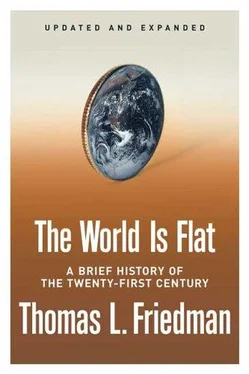Judging from an essay in the journal Accounting Today (June 7, 2004), this does, indeed, seem to be the future. L. Gary Boomer, a CPA and CEO of Boomer Consulting in Manhattan, Kansas, wrote, “This past [tax] season produced over 100,000 [outsourced] returns and has now expanded beyond individual returns to trusts, partnerships and corporations... The primary reason that the industry has been able to scale up as rapidly as it has over the past three years is due to the investment that these [foreign-based] companies have made in systems, processes and training.” There are about seventy thousand accounting grads in India each year, he added, many of whom go to work for local Indian firms starting at $100 a month. With the help of high-speed communications, stringent training, and standardized forms, these young Indians can fairly rapidly be converted into basic Western accountants at a fraction of the cost. Some of the Indian accounting firms even go about marketing themselves to American firms through teleconferencing and skip the travel. Concluded Boomer, “The accounting profession is currently in transformation. Those who get caught in the past and resist change will be forced deeper into commoditization. Those who can create value through leadership, relationships and creativity will transform the industry, as well as strengthen relationships with their existing clients.”
What you're telling me, I said to Rao, is that no matter what your profession-doctor, lawyer, architect, accountant-if you are an American, you better be good at the touchy-feely service stuff, because anything that can be digitized can be outsourced to either the smartest or the cheapest producer, or both. Rao answered, “Everyone has to focus on what exactly is their value-add.”
But what if I am just an average accountant? I went to a state university. I had a B+ average. Eventually I got my CPA. I work in a big accounting firm, doing a lot of standard work. I rarely meet with clients.
They keep me in the back. But it is a decent living and the firm is basically happy with me. What is going to happen to me in this system?
“It is a good question,” said Rao. “We must be honest about it. We are in the middle of a big technological change, and when you live in a society that is at the cutting edge of that change [like America], it is hard to predict. It's easy to predict for someone living in India. In ten years we are going to be doing a lot of the stuff that is being done in America today. We can predict our future. But we are behind you. You are defining the future. America is always on the edge of the next creative wave... So it is difficult to look into the eyes of that accountant and say this is what is going to be. We should not trivialize that. We must deal with it and talk about it honestly... Any activity where we can digitize and decompose the value chain, and move the work around, will get moved around. Some people will say, Yes, but you can't serve me a steak.' True, but I can take the reservation for your table sitting anywhere in the world, if the restaurant does not have an operator. We can say, Yes, Mr. Friedman, we can give you a table by the window.' In other words, there are parts of the whole dining-out experience that we can decompose and outsource. If you go back and read the basic economics textbooks, they will tell you: Goods are traded, but services are consumed and produced in the same place. And you cannot export a haircut. But we are coming close to exporting a haircut, the appointment part. What kind of haircut do you want? Which barber do you want? All those things can and will be done by a call center far away.”
As we ended our conversation, I asked Rao what he is up to next. He was full of energy. He told me he'd been talking to an Israeli company that is making some big advances in compression technology to allow for easier, better transfers of CAT scans via the Internet so you can quickly get a second opinion from a doctor half a world away.
A few weeks after I spoke with Rao, the following e-mail arrived from Bill Brody, the president of Johns Hopkins University, whom I had just interviewed for this book:
Dear Tom, I am speaking at a Hopkins continuing education medical meeting for radiologists (I used to be a radiologist)... I came upon a very fascinating situation that I thought might interest you. I have just learned that in many small and some medium-size hospitals in the US, radiologists are outsourcing reading of CAT scans to doctors in India and Australia!!! Most of this evidently occurs at night (and maybe weekends) when the radiologists do not have sufficient staffing to provide in-hospital coverage. While some radiology groups will use teleradiology to ship images from the hospital to their home (or to Vail or Cape Cod, I suppose) so that they can interpret images and provide a diagnosis 24/7, apparently the smaller hospitals are shipping CAT scan images to radiologists abroad. The advantage is that it is daytime in Australia or India when it is nighttime here-so after-hours coverage becomes more readily done by shipping the images across the globe. Since CAT (and MRI) images are already in digital format and available on a network with a standardized protocol, it is no problem to view the images anywhere in the world... I assume that the radiologists on the other end... must have trained in [the] US and acquired the appropriate licenses and credentials... The groups abroad that provide these after-hours readings are called “Nighthawks” by the American radiologists that employ them. Best, Bill
Thank goodness I'm a journalist and not an accountant or a radiologist. There will be no outsourcing for me-even if some of my readers wish my column could be shipped off to North Korea. At least that's what I thought. Then I heard about the Reuters operation in India. I didn't have time to visit the Reuters office in Bangalore, but I was able to get hold of Tom Glocer, the CEO of Reuters, to hear what he was doing. Glocer is a pioneer in the outsourcing of elements of the news supply chain.
With 2,300 journalists around the world, in 197 bureaus, serving a market including investment bankers, derivatives traders, stockbrokers, newspapers, radio, television, and Internet outlets, Reuters has always had a very complex audience to satisfy. After the dot-com bust, though, when many of its customers became very cost-conscious, Reuters started asking itself, for reasons of both cost and efficiency: Where do we actually need our people to be located to feed our global news supply chain? And can we actually disaggregate the work of a journalist and keep part in London and New York and shift part to India?
Glocer started by looking at the most basic bread-and-butter function Reuters provides, which is breaking news about company earnings and related business developments, every second of every day. “Exxon comes out with its earnings and we need to get that as fast possible up on screens around the world: 'Exxon earned thirty-nine cents this quarter as opposed to thirty-six cents last quarter.' The core competency there is speed and accuracy,” explained Glocer. “You don't need a lot of analysis. We just need to get the basic news up as fast as possible. The flash should be out in seconds after the company releases, and the table [showing the recent history of quarterly earnings] a few seconds later.”
Those sorts of earnings flashes are to the news business what vanilla is to the ice cream business-a basic commodity that actually can be made anywhere in the flat world. The real value-added knowledge work happens in the next five minutes. That is when you need a real journalist who knows how to get a comment from the company, a comment from the top two analysts in the field, and even some word from competitors to put the earnings report in perspective. “That needs a higher journalistic skill set-someone in the market with contacts, who knows who the best industry analysts are and has taken the right people to lunch,” said Glocer.
Читать дальше












